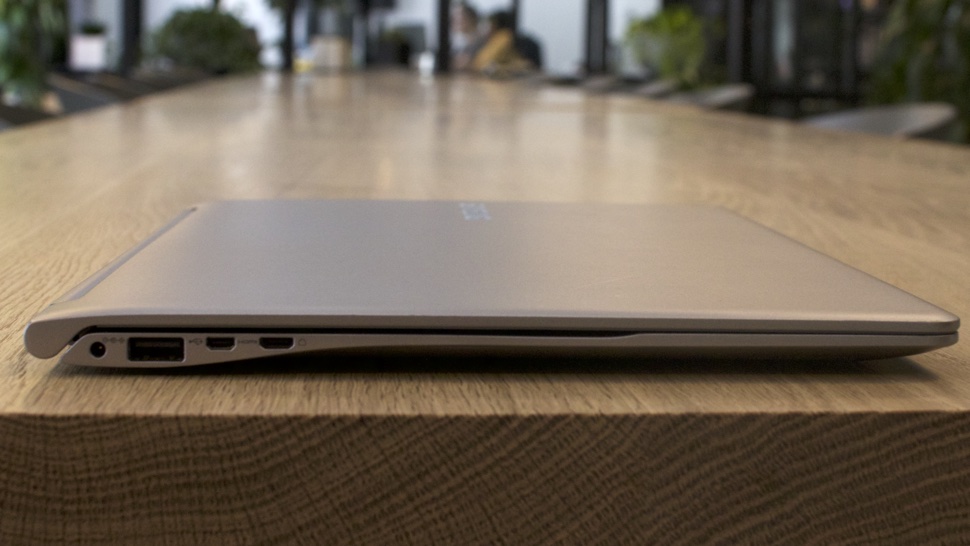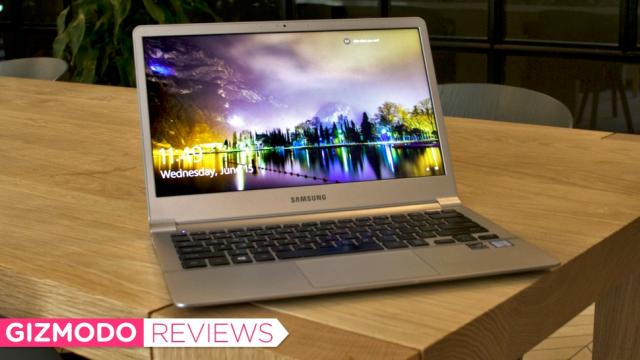If Windows 10 is going to win legions of people over as more than the operating system that you have on your work computer, it needs gear like Samsung’s new Notebook 9. It’s not the most-powerful Windows laptop, or the prettiest. It’s just a valiant crack at a no bullshit machine that’s a pleasure to use and doesn’t cost a fortune.
In fact, it balances design and power so well that its fatal flaw — middling battery life — is devastating.
AU Editor’s Note: The Samsung Notebook 9 isn’t available in Australia, but you can buy it online or internationally and have it shipped here, as long as you’re willing to pay the necessary costs. — Cam
What Is It?
At its very best, Samsung’s Notebook 9 handles so smoothly that I wield it with thoughtless confidence — like it might as well be a spiral-bound Mead. I love this little machine most of all for its breezy lightweight design. At just 1kg, it’s lighter than any other proper laptop you might compare it to (think a 1kg Dell XPS 13 or even Apple’s teensy 1kg MacBook). The numbers alone don’t do its weightlessness justice though. It’s genuinely astounding how light this laptop is — it’s great fun to hand the grey slab to people and watch their eyes light up with surprise.
Beyond its weight, the Notebook 9 is a solidly designed hunk of hardware that’s never getting in my way. Its keyboard and trackpad are very good, and though the display isn’t going to win a beauty pageant, it’s just fine for watching Netflix and reading email.
At $US1000 ($1,357) for the base configuration, the Notebook 9 isn’t Chromebook cheap — it’s not even Windows laptop cheap, but it’s accessible to an audience of people who want to buy a solid machine to last for years. Its Intel Core i5 processor is more than enough to tweak photos Photoshop, listen to music, and hit a few websites.
What Samsung’s accomplished here is, I think, a first crack at the simpler, smarter laptop Windows needs — it’s a little bit what the MacBook Air was for OS X five years ago.
It’s been clear since Windows 10 dropped in July 2015 that Microsoft has finally tuned its core OS into software you actually want to use. It’s refined, powerful, and simple enough that a normal person feels right at home. For years — lo, for more than a decade — people begrudgingly slogged along with clunky Windows software because it’s what the IT department gave them, or because they couldn’t afford the polish that came with Apple’s MacBook lines and OS X.
At the same time, Windows has emerged as a platform for weird franken-hardware — years of experimentation which culminated last year in the innovative, if quite expensive, Surface Book. In part, the Notebook 9 accomplishes its thrifty size by abandoning much of the baggage that Windows manufacturers have strapped to laptops in a gimmick-minded effort to make their devices standout: The streamlined design doesn’t have a back-flipping hinge, a touchscreen, or even metal casing. The humble concept is revelatory. The Notebook 9 might be closer to what will make Windows attractive on a broader scale. It turns out Windows doesn’t need a fancier design — it needs smarter design.

And almost everything about the Notebook 9 feels smart. Of course, the Notebook 9 isn’t perfect and you’ll suffer some for its simplicity. Right from the outset, this thing isn’t a stunner visually. Samsung’s done an admirable job of trying to make the grey plastic build look sleek-but this isn’t a snazzy aluminium computer and it feels it.
The biggest pitfall, however, is the computer’s battery life. When the Notebook 9 was announced I speculated that the machine’s downfall might be its relatively small battery. Unfortunately, that’s the case. The Notebook 9 has got a 30Wh battery. That’s almost half the size of the XPS 13’s 56Wh battery. Though Intel’s latest (Skylake) Core-series processors are optimised to conserve power, the Notebook 9’s is too small to begin with. If you’re lucky, you’ll get four hours of life, but three is more realistic. A standard laptop these days might hit 7 or 8 hours and beyond.
It’s because Samsung has chosen to go for performance over battery life. Where many streamlined laptops — the MacBook, for example — opt to use Intel’s middling but power-friendly Core M processors, the Notebook 9 I tested came with a latest generation Intel Core i5 processor.
In the real world, this means that you’re getting the bottom end of premium computer performance — which is good — at the cost of battery life. I suspect the Core i5 is right in the strike zone for most people after the Notebook 9. It will handle a heavy workload apart from gaming and video production. But that crappy battery is a huge bummer. If I leave the office and want to watch some Netflix at home, I’ve got to take the power cable with me!
Should You Buy It?
Yet if I had to buy a laptop tomorrow — and I’m in the market for a new laptop — I would seriously consider the Notebook 9, despite the frustratingly feeble battery. I’m willing to suffer the indignity of dragging a power cable around more often than I’d like in exchange for this computer’s very lightweight design.
I suspect that the battery should be enough to keep people who are constantly on the go from buying in. But if you’ve got regular access to a power source it’s a laptop to consider. The Samsung Notebook 9 is great, and I love it. It’s very close to being the perfect Windows 10 laptop for almost everyone — but it’s not quite there yet.
README
- This thing is so light, sometimes I feel like I could throw it like a frisbee
- Powerful enough that it won’t choke no matter how many porn tabs you have open
- Battery life is an abomination and you end up needing to lug your charger more often than you want to
- More laptops like this. I like this.
